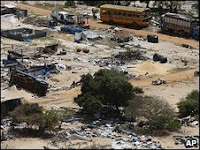The UN secretary general has dismissed allegations that the UN covered up a high civilian death toll during the last phase of the Sri Lanka conflict.
Ban Ki
 -Moon said he "categorically rejected" reports that the UN had "deliberately underestimated" the toll.
-Moon said he "categorically rejected" reports that the UN had "deliberately underestimated" the toll. French and British newspapers, citing confidential UN reports, last week said more than 20,000 civilians were killed.
The Sri Lankan government has strongly denied the claims surrounding its recent onslaught against Tamil rebels.
The figure was also disputed by UN human rights chief John Holmes who said an investigation would be a good idea.
'Not yet known'
"I categorically reject - repeat, categorically - any suggestion that the United Nations ha s deliberately underestimated any figures," Mr Ban said in a speech to the General Assembly.
s deliberately underestimated any figures," Mr Ban said in a speech to the General Assembly.
"In regard to some reports in the media, I should emphasise that the final total is not yet known," the UN secretary general said.
"Most of these figures do not emanate from the UN and most are not consistent with the information at our disposal," he said.
Debris was seen in the conflict zone after Sri Lanka declared the war over
The secretary general added: "Let me also say, whatever the total, the casualties in the conflict were unacceptably high."
On 23 May, Mr Ban visited a huge camp for refugees who fled fighting between Tamil rebels and government forces.
The UN secretary general toured the main government-run camp for about 220,000 refugees at Manik Farm, near Vavuniya.
The figure of 20,000 - published last week by the French newspaper Le Monde and then the Times newspaper in the UK and quoting official UN documents and witness accounts - is far higher than previous estimates.
The UN has said that there were no confirmed estimates of civilian casualties, and its last estimate two weeks before the end of the war said 6,500 people had died.
The Sri Lankan government has strongly denied the claims surrounding its recent onslaught against Tamil rebels.
The figure was also disputed by UN human rights chief John Holmes who said an investigation would be a good idea.
'Not yet known'
"I categorically reject - repeat, categorically - any suggestion that the United Nations ha
 s deliberately underestimated any figures," Mr Ban said in a speech to the General Assembly.
s deliberately underestimated any figures," Mr Ban said in a speech to the General Assembly."In regard to some reports in the media, I should emphasise that the final total is not yet known," the UN secretary general said.
"Most of these figures do not emanate from the UN and most are not consistent with the information at our disposal," he said.
Debris was seen in the conflict zone after Sri Lanka declared the war over
The secretary general added: "Let me also say, whatever the total, the casualties in the conflict were unacceptably high."
On 23 May, Mr Ban visited a huge camp for refugees who fled fighting between Tamil rebels and government forces.
The UN secretary general toured the main government-run camp for about 220,000 refugees at Manik Farm, near Vavuniya.
The figure of 20,000 - published last week by the French newspaper Le Monde and then the Times newspaper in the UK and quoting official UN documents and witness accounts - is far higher than previous estimates.
The UN has said that there were no confirmed estimates of civilian casualties, and its last estimate two weeks before the end of the war said 6,500 people had died.
On Saturday, leading human rights group Amnesty International called for an urgent inquiry into claims of civilian deaths.
The group also urged the UN to publicise its estimate of the death toll.
The UN's senior humanitarian affairs co-ordinator John Holmes queried the figures but said the claims needed to be examined.
"I think a lot of the figures which are floating around don't have much justification behind them.
"But nevertheless, there have been serious charges against the [Tamil Tiger rebels]... for holding civilians as human shields for such a long time, and thereby being indirectly responsible for their deaths.
"And against the government for using heavy weapons in an area where there are so many civilians and thereby, not deliberately, but again causing many civilian deaths."
He added: "No-one was there, no-one knows and we may never know. And that's why an investigation would be a good idea."
Foreign journalists and humanitarian groups were barred from the conflict zone and although the Red Cross entered, it does not give evidence in international courts.
Senior Sri Lankan officials have consistently denied the accusation.